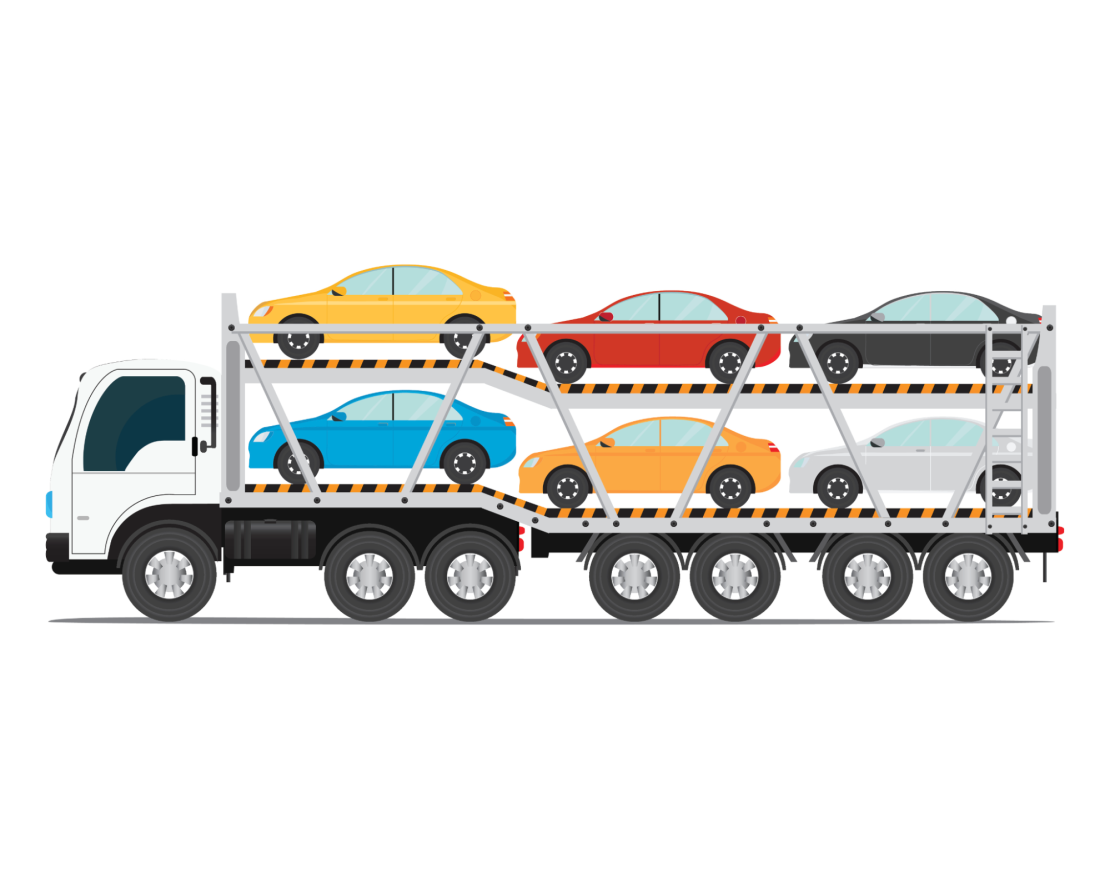If you’re considering shipping your vehicle to take some of the hassle out of your upcoming cross-country move but need help knowing where to start, we can help. How much it costs to ship your vehicle depends on the distance, vehicle size, shipping method and even the time of year. We’ve broken down some of the most important elements of shipping cars to help you calculate how much it could cost for you to ship a vehicle.
Key takeaways
On average, it costs $626 to $1,867 — $0.63 to $1.87 per mile — to ship a car.
Save money on car shipping by using an open carrier, shipping during the fall or winter months and gathering at least three quotes.
The distance, type of car, shipping method and vehicle condition impact the total cost.
Featured Partners
Vehicle types: Cars, motorcycles
Availability: All 50 states, international shipping
Vehicle types: Cars, trucks, boats, motorcycles, RVs, trailers, golf carts, heavy equipment
Availability: All 50 states, international shipping
Vehicle Types: Cars, motorcycles
Availability: 49 states, international (excludes Alaska)
Average cost to ship a car
The average cost to ship a car varies from $626 to $1,867, making it hard to know how much you’ll pay. But with a bit of investigative work — and some mathematician skills — you can come to a rough estimate of your car shipping costs.
You can understand the average shipping cost for your car by looking at the vehicle size, distance and price per mile. Local shipping costs the most per mile, but you’ll pay the least in terms of distance, with totals typically falling between $555 and $847. Long-distance shipping costs between $1,211 and $1,585, while cross-country shipping costs upwards of $1,247 to $2,470. Then there’s the size of your vehicle, which can cost up to $400 extra for heavy-duty trucks.
Let’s untangle these numbers by looking at a quick chart of how much it costs to ship a car by vehicle size, distance and mileage:
Average costs of car shipping
|
Distance
|
Average cost*
|
Average rate per mile
|
|
|---|---|---|---|
| Sedan | 1,000 miles |
$938 |
$0.94 |
| Compact SUV | 1,000 miles |
$1,063 |
$1.06 |
| SUV | 1,000 miles |
$1,188 |
$1.19 |
| Truck | 1,000 miles |
$1,338 |
$1.34 |
* To arrive at the average costs in this article, editorial team members surveyed a range of 11 providers on national and local levels. All averaged figures were correct at publication and may be subject to change.
Factors that impact car shipping costs
Car shipping costs can be challenging to pinpoint, but breaking down some of the most significant factors can help paint a picture of your total budget. We’ve broken down the distance, vehicle size and condition, season, type of carrier and delivery locations below.
Shipping distance
Shipping your car ranges from $0.63 to $1.87 per mile on average, but some carriers may charge as little as $0.40 or as high as $2 per mile, depending on the complexity. As with many in-bulk purchases, the farther your shipping company has to drive, the lower they’ll charge per mile. In other words, cross-country transportation costs as low as $0.63 per mile, while local transportation can cost approximately $1.69 per mile.
|
Average cost (per mile)
|
Total average cost*
|
|
|---|---|---|
| 500 miles | $1.11 – $1.69 |
$550 – $847 |
| 1,000 - 1,500 miles | $1.21 – $1.59 |
$1,211 – $1,585 |
| 2,500 miles | $0.63 – $1.24 |
$1,269 – $2,470 |
* To arrive at the average costs in this article, editorial team members surveyed a range of 11 providers on national and local levels. All averaged figures were correct at publication and may be subject to change.
Open or enclosed carrier
Another prime factor in determining the cost of shipping your vehicle is whether you choose an open or enclosed carrier to transport your car. Open carriers cost significantly less than enclosed carriers, coming in between $829 and $1,615 on average, depending on the distance.

Enclosed carriers, on the other hand, cost around $1,174 to $2,143 — or roughly up to 50% more than open transportation. Enclosed carriers offer better protection against the elements because they ship your car in a transporter that’s closed on all sides. In contrast, open carriers leave your vehicle exposed to rocks, debris, car wrecks and crime. Enclosed carriers are ideal for transporting luxury or antique vehicles.

Pick-up and drop-off locations
Having your vehicle delivered straight to your doorstep in a door-to-door delivery comes at a cost. However, it’s more secure than terminal-to-terminal delivery, where the drivers leave your vehicle in a terminal until you can arrive to pick it up.
Season
You could spend between $860 and $1,450 to ship your car from mid-May to mid-September, the peak moving season. This 15% increase in auto shipping costs comes down to the higher demand for travel and moving services during the summer months.
But summer isn’t the only seasonal factor. If you live in a region with snowfall or holiday-goers, you could also see a spike in winter prices to accommodate traffic and inclement weather.
Heidi Schulze, a broker for Auto Shipping Group said, “You have a lot of snowbirds that want to ship in September and October, and then you have November and December where a lot of people are trying to ship to go home.” So, consider your region when trying to avoid high seasonal demands.
Vehicle size and condition
Heavier and inoperable vehicles will cost more to ship than operable, lightweight vehicles. A broken vehicle may need towing services to put the car onto the carrier, which can cost around $100 on average.
Likewise, companies factor in the car’s weight, as more weight adds to the fuel cost and increases wear and tear on the transportation vehicle. SUVs, trucks and vans can add anywhere from $150 to $600 to the shipping cost of your vehicle.
What’s the cheapest way to ship a car?
You can lower the cost of shipping a car in several ways. Schulze recommends calling and booking ahead of time to compare available carriers. “Most carriers book out a week at a time, so many carriers require a lead time of about seven to 10 days. If a customer can book ahead of schedule, that’s the best way to save some money and get multiple interested carriers,” she explained.
In addition, you can also try these tips to get the cheapest car shipping costs for your next move:
- Go with an open carrier rather than an enclosed carrier for your transportation method.
- Ship your car during the off-season (late fall through winter) to save up to 30% due to lower demand.
- If you have multiple cars and plan on driving one to your destination, ship the lightest car.
- Consider repairing your inoperable vehicle if doing so would cost less than shipping an inoperable vehicle.
- Avoid paying extra for door-to-door shipping and pick up your vehicle at a terminal-to-terminal drop-off instead.
- Skip the storage options to avoid storage costs.
- Shop around for the cheapest car shipping companies near you by asking for at least three different quotes.
- Though fuel prices fluctuate frequently, try scheduling your car shipment when diesel prices are low and hold off during high fuel prices if you can.
How does the car shipping process work?
Shipping a car doesn’t have to be a daunting experience. Understanding how the car shipping process works can make shipping your vehicle a quick and streamlined experience. Follow these steps to get off on the right foot.
1. Research car shipping companies
Don’t settle for the first car shipping company you see. Putting all your eggs in one basket can limit your options and prevent you from finding the cheapest car shipment costs near you. Always research car shipment companies to find at least three companies to compare rates, reviews and services.
2. Ask questions
Before you call prospective auto transport companies, jot down questions to ask each company to get a good feel for what each company has to offer. Common questions to have on hand include:
- Where can you drop off my vehicle?
- What is the total estimated cost?
- Is this rate fixed or adjustable depending on unforeseen circumstances?
- How much do I have to pay upfront?
- Is there a deposit fee?
- Can I have a few testimonials from other customers?
- Do you offer enclosed transportation?
3. Watch out for scams
Car shipping scams can cost you big time, so knowing what to look out for is essential before investing in an auto transport company. If you can’t find online reviews — or your car shipping company expects you to pay in full before providing any services — there’s a chance that you’re dealing with a scammer.
Bottom line
The cost to ship a car depends on so many factors that it can take time to determine the best ways to approach auto transportation. For shorter distances, driving your own vehicle may be more economical. But long distances, inoperable vehicles, specialty cars and logistics may make investing in a local auto transport company the best option for your move.



















